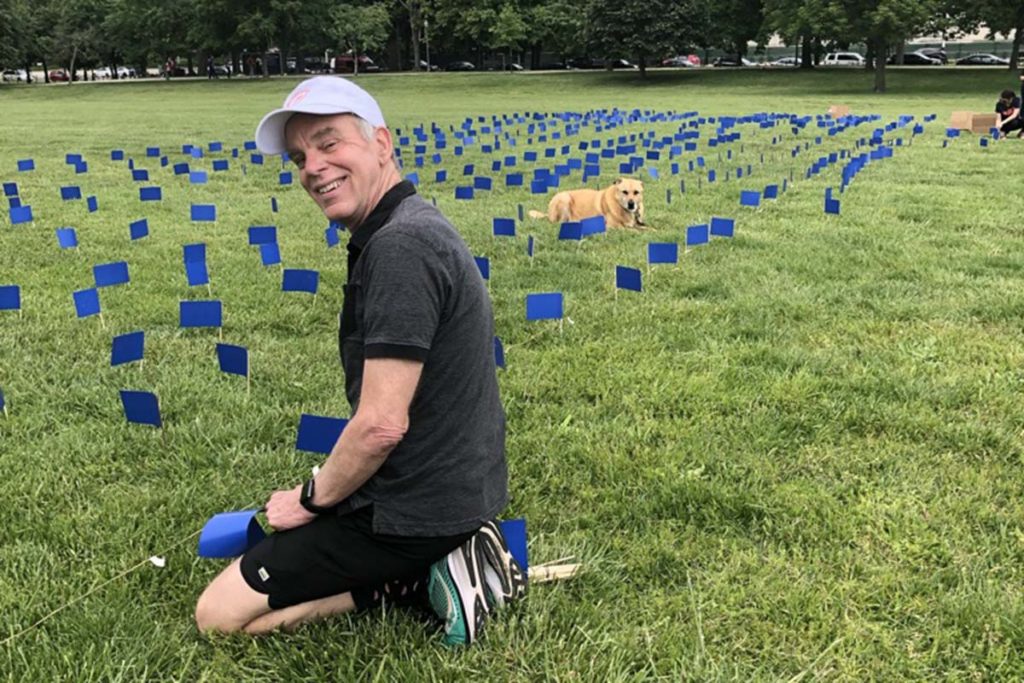A pediatrician for 40 years, James Plews-Ogan, MD, took care of many children with rare diseases. They had complex medical needs — and often, disabilities. Now he’s the one facing a rare, disabling disease: amyotrophic lateral sclerosis (ALS). But Plews-Ogan is fierce. As a doctor with ALS, he’s taking action against this devastating disease.
“I’ve seen what it takes for families to cope with a serious illness and disability,” says Plews-Ogan, diagnosed by UVA Health ALS experts in December. In light of the poor ALS prognosis, he retired from UVA Children’s in February, after 10 years as a clinician and faculty member. “These families deal with stress and frustration. At the same time, insurance often limits their access to the services their children need. Seeing that sparked my desire to act for the ALS community.”
Are You or a Loved One Facing ALS?
Our ALS clinic can help you navigate life with this degenerative disease.
Weak Grip, Muscle Twitching Are First Signs of ALS
Plews-Ogan comes from a long line of southpaws. His mother and grandfather were left-handers, too. But his left hand began failing him over a year ago. That’s when he knew something was wrong.
His grip weakened. Then, he began struggling with tasks like writing clinic notes and preparing vaccine syringes.
At first, Plews-Ogan brushed it off. Surely it wasn’t anything to worry over. Maybe arthritis? Or a pinched nerve? But those couldn’t explain the muscle twitches.
Before UVA neurologist Matthew P. Elliott, MD, made the diagnosis, Plews-Ogan suspected ALS.
What Is ALS?
ALS, or Lou Gehrig’s disease, is a neurological disease. It causes cells of the central nervous system to stop working or die. The result? Eventually, people with ALS lose functions like:
- Balance
- Breathing
- Movement
- Swallowing
- Talking
There is no cure. The average life expectancy for people with ALS is 2 to 5 years.
Facing ALS, a Doctor Has to Leave His Pediatric Practice
At UVA Children’s, Plews-Ogan was known for innovative care. One of his lasting contributions is cofounding the By Your Side clinic. It gives coordinated care for kids with complicated medical needs. Most important, the doctors often make house calls.
Now that he’s retired, Plews-Ogan channels his creative energy toward improving the ALS prognosis for himself and others.
Doctor’s New Focus: Speeding Up Access to New ALS Treatments
Plews-Ogan and his wife, Margaret “Peggy” Plews-Ogan, MD, created the Hummingbird Fund. The organization promotes awareness of and support for ALS. Their adult children, Erin and William, are part of this effort. Additionally, the organization partners with national nonprofits such as I AM ALS and the ALS Association.
Launched in April, the Hummingbird Fund strives to:
- Close gaps in care for patients with ALS
- Speed up access to new therapies for ALS
- Get more funding for ALS research
Because of their careers in medicine, the Plews-Ogans understand the U.S. healthcare system. As a result, they are positioned to influence change. Above all, they hope to help improve quality of life for people with ALS, as well as caregivers.
Hummingbirds’ Stamina Stands for Resilience of People with ALS
So, why did the Plews-Ogan family name their foundation after a tiny bird?
Because the nimble, quick hummingbird is small, but mighty. And hummingbirds can travel hundreds of miles, nonstop, in a day.
“Hummingbirds have stamina. But they’re also delicate and beautiful,” Plews-Ogan says. “We loved that symbolism for people with ALS.”
Channeling His Grief, a Doctor With ALS Fights for Others
Plews-Ogan shares his ALS journey in his blog, Offering Kindness. Recently, he wrote: “ALS is steeped in loss. Loss of function. Loss of dignity and autonomy. Loss of futures. And eventually, loss of loved ones.”
As he navigates the grief that comes with ALS, Plews-Ogan wants to help make life better for others with the disease. That’s why he tells his story to anyone with the power to fuel change. For example, in a virtual session with U.S. congressional staff, he urged swift legislative action to approve promising ALS therapies. Doing so could improve the ALS prognosis so it becomes a chronic disease, rather than a terminal one.
“There are many ALS drugs in the pipeline,” says Plews-Ogan. He volunteered for an ALS study at the National Institutes of Health (NIH). “We’re advocating for the FDA approvals to be faster and more efficient for people with ALS. This illness causes rapid degeneration. So, ALS patients can’t wait around for an extensive drug approval process.”
Want to learn more about the Hummingbird Fund? Email thehummingbirdfund@gmail.com.
